Recap of the 2016 Sports PR Summit Presented by The Players’ Tribune
May 22, 2016
The 2016 Sports PR Summit presented by The Players’ Tribune took place on May 17 at The Players’ Tribune in New York City. Senior executives, athletes and select media came together for featured conversations and panel discussions over the course of the full-day event.
Below is a recap written by Sports PR Summit Academic Partner Marist Center for Sports Communication.
PR from the Owner’s Perspective
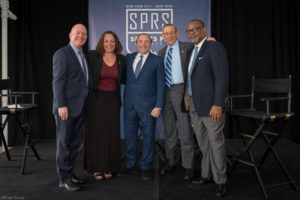
The day began with a conversation about sports PR through the eyes of an owner, featuring Stephen M. Ross, majority owner of the Miami Dolphins (@MiamiDolphins) and founder of RISE (@RISEtowin). In conversation with Brian Berger (@SBRadio), Founder of the Sports PR Summit, Ross advised PR executives that being transparent and honest is always the best PR approach.
Ross sees “sports as the common denominator of the world today.” He stressed the importance of seizing any opportunity where you can make an impact, which was the ethos behind his founding of RISE (Ross Initiative in Sports for Equality). Ross discussed how bullying incidents between Dolphin players Richie Incognito and Jonathan Martin served as the inspiration in building a program that brings teams and leagues together to create a dialogue and make an important change in the culture of sports and society.
Ross reminded the audience that sports can and should be a leader in addressing issues that go beyond the field of play. “The public is looking to sports to deal with social issues, which has never been the case before,” Ross said.
Joining Ross on stage later in the session were NHL Commissioner Gary Bettman; Ndidi Massey, Executive Director of RISE, and Kenneth Shropshire, Professor and Director of the Wharton Sports Business Initiative.
During the discussion, Berger addressed on topics such as athlete accountability with social media and the responsibility of athletes and sports organizations to be involved in social issues.
The panel agreed that PR in sports can be used to promote positive initiatives and does not have to be viewed cynically, as many outsiders do. It gives fans a newfound voice and allows athletes to stand up for issues that they believe in. The panel asserted that sports is one of the few areas that has the ability to bring together a diverse group of people and confront world problems.
Shropshire described how RISE attempted to do just that, detailing their efforts in school districts to use the positive power of professional athletes to educate students about equality and respect for others. For RISE, the key is to develop a curriculum with real content that works with kids at the youngest level possible.
As Ndidi Massey said, “Public awareness and change will come from education.”
Bettman believe that athletes are held to higher standards than in the past, and athletes have the opportunity to step up to this challenge.
“This is an era where there is more accountability than ever before, and that’s not a bad thing.” said Bettman. “An overwhelming number of our players have devoted themselves, their families and resources to social issues and change.”
Women in Sports
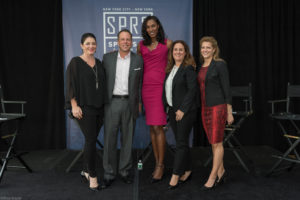
Moderated by Gina Lehe (@Gina_Lehe), senior director of communications and brand management for College Football Playoff, Mary Scott (@UnitedEntGroup), president of sports & brand experience for United Entertainment Group, Kraig Kann (@KraigKann), CCO of the LPGA, Bonnie Bernstein (@ Bonnie Bernstein), vice president of content and brand development and host of Campus Insiders and Lisa Leslie (@LisaLeslie), WNBA champion and Olympic gold medalist talked about the presence of women in sports and the importance of personal brands.
Leslie began the discussion admitting that while there are obstacles for women climbing to executive positions in sports, there are also many advocates for women in the industry. “There are a lot of people rooting for their daughters, rooting for their wives, and wanting them to be successful,” Leslie said.
Authenticity was a key and repeated word throughout the discussion. Creating an authentic brand allows women in sports to tell stories and connect with consumers.
Panelists also remarked that women need to constantly be on their guard, more so than men in the sports industry. “The margin for error for women is very small” explained Leslie. “Women want to try to be who they are, but can find difficulty when they are criticized for doing just that.”
The panel asserted that media was a key factor in shaping the perception of women in sports. Panelists also stressed the need to work with the media to change the often biased and unfair perception.
When asked about the backlash that women often face on social media, the panel noted that while it can be entertaining to call out Twitter trolls, a better strategy is to use negative comments to actually start constructive conversations.
Leveraging the Stage of an Olympic Games
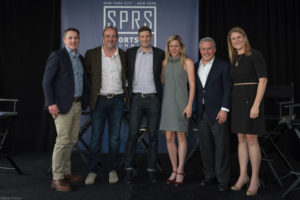
The final panel of the morning featured Joey Cheek (@JoeyCheek), 2006 Olympic gold medalist speed skater; Jill Geer (@JillGeer), chief public affairs officer of USA Track and Field; Kate Johnson (@KateLJohnson); director of Olympic marketing for VISA and 2004 Olympic silver medalist; Ossian Shine (@OssianShine), Global Editor of Sports at Reuters; and Ty Votaw (@PGATours), EVP and CMO of the PGA Tour and vice president of International Golf Federation. Dave Mingey (@DaveMingey), co-founder of Glideslope, moderated the discussion which examined the importance of the athletes’ voices in Olympic coverage.
Throughout the session, panelists stressed that creating a powerful campaign happens when communications teams focus on helping athletes tell their stories. Brands, through large-scale marketing campaigns, have the ability to tell the stories of the Olympic athletes. This should be a focused, deliberate process, as the most successful campaigns begin their planning process early and allow for genuine, harmonious athlete moments.
Geer noted that a lot of thought goes into what an athlete should or should not say to the media, but ultimately, athletes should speak their version of the truth. When discussing the media training that Olympic athletes undertake, Geer said, “We take a pretty light-handed approach to how we train athletes because over-trained people aren’t authentic.”
Johnson echoed Geer’s sentiments, emphasizing the organic nature of athletic moments. “We want to foster organic moments between these athletes,” Johnson said. “You cannot manufacture them. You have to foster them organically.”
Shine shared his perspective on covering major sporting event. He noted that journalists must be transparent on what information you are getting and where you are getting it from. Furthermore, Shine noted the critical nature of maintaining trust with teams and athletes you cover. This relationship is a cornerstone of the reporting process.
The panel also discussed just how important and far-reaching Olympic athletes are to communities around the world. Athlete driven campaigns must recognize this potential.
“It is easy to forget that this thing, this weird global giant sports mega-business that has evolved, it was originated as this idealistic sort of sports festival,” Cheek said. “There are these very brief moments when you get to see that the underlying beauty of what this thing can be is still there.”
AFTERNOON SESSION:
Roundtable Discussion with The Players’ Tribune
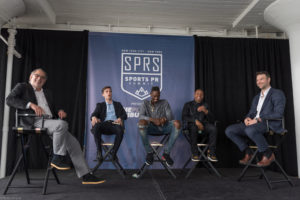
The afternoon session kicked-off with an athletes’ round table discussion, moderated by Gary Hoenig, editorial director of The Players’ Tribune, and Sean Conboy, deputy editor of The Players’ Tribune. Athletes on the panel included Boston Celtics All-Star Isaiah Thomas (@Isaiah_Thomas), former NBA player Larry Sanders (@LarrySanders), and 2016 NHL All-Star Game MVP John Scott.
All players featured on the panel have used The Players’ Tribune to tell their personal stories and connect with fans in an authentic, personal, and direct way. As Conboy noted, The Players’ Tribune seeks to convey athletes as human beings, which can be difficult to do in today’s day and age.
“The Players’ Tribune is an easier outlet for athletes because it’s your word,” Thomas said. “Your words don’t get twisted.”
Throughout the discussion, athletes on the panel expressed their belief that media can portray them in a false light because of their own bias. Additionally, athletes believed the press didn’t always respect the fact that they have private lives beyond their athletic responsibilities.
“As a player, you don’t get to choose your image. It’s kinda portrayed by the media,” Sanders said. “When there’s no communication, it’s all imagination.”
Panelists appreciated the fact that The Players’ Tribune has opened a door for athletes to tell their own story the way that they want it to be told. “It’s me,” Thomas said. “Not anyone else.”
In addition, the topic of social media was discussed as it relates to fan criticism. As explained in earlier panels, social media tools have allowed athletes a collective voice. However, it also enabled them to be the center of tough comments from fans, both of their team and opposing teams. Panelists stressed the fact that fans may not realize how critical they are of athletes who have worked extremely hard. The Players’ Tribune aims to alleviate some of the unwarranted criticism by allow athletes to speak more direct to their fans, allowing them to understand the effort that goes into the athletic experience.
Scott believes that journalists rarely take enough time to get to know the athletes off-the-record.
Panelists concluded by iterating their belief that the demand for the real, unedited voices of an athlete is high, and The Players’ Tribune hopes to work with an increasingly number of athletes to fill that need.
PR From the Elite Athlete’s Perspective
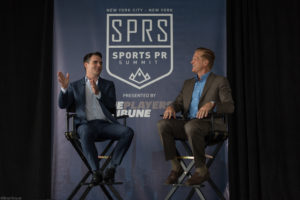
The afternoon continued with a featured conversation between four-time NASCAR Cup Series champion and FOX Sports analyst Jeff Gordon (@JeffGordonWeb) and Ric Bucher (@RicBucher) of Bleacher Report and SiriusXM Radio about the importance of a public relations team and media throughout an athlete’s career.
Gordon stressed the fact that over the course of 20 years, he and his publicist, Jon Edwards, developed a close relationship built on trust. As Gordon pointed out, he has appreciated Edwards unbiased opinions, often offering alternative perspectives.
“He has never been afraid to tell me I was wrong,” Gordon said. “You need someone who is honest with you but supportive.”
Gordon also added that a strong PR team can be beneficial for establishing sponsorships and partnerships. When athletes are focused on races and the latest news regarding the circuit, PR teams are able to coordinate busy schedules and balance professional priorities with fan engagements and promotions.
Since Gordon has transitioned from the track to the booth, he has become more aware of how media can portray athletes. While in the booth, he tries to put himself in the mindset of the driver and the team in order to provide a good balance of entertainment and information.
“I want to tell a story. I want to point out facts. But I’m always looking to help the sport grow,” Gordon said.
While he admits that he did not initially understand the concept of social media, specifically Twitter, Gordon has learned to appreciate the interactive platforms over the years.
“It’s a tool for you to build your brand and bridge that gap of personality you have,” Gordon said.
Gordon did warn that content posted on social media shouldn’t simply be viewed as an athlete’s place to speak freely. Instead, Gordon treats social media as part of his business operation.
When it comes to interacting with fans, Gordon and his team has taken a proactive initiative to follow 24 devoted followers each week. This has allowed him to receive positive feedback from fans through responses and retweets.
According to Gordon, “As long as there are people out there that want to interact, we will try to balance out interacting with them.”
For Gordon, the main goal of social media is to help build his authenticity and help him to develop his brand.
US Major Pro Sports League Roundtable

The fourth annual Sports PR Summit concluded with a panel featuring the heads of communications from the major professional sports league in the US. The roundtable discussion was moderated by Kristi Roehm, founder of 8 Degrees PR (@8degreespr) and included Brian McCarthy (@NFLPRguy), vice president of communications for the NFL; Mike Bass (@MBassNBA), senior vice president of communications for the NBA; Matt Bourne (@MLBPR), vice president of communications for MLB; Dan Courtemanche (@courtemancheMLS), executive vice president of communications for MLS; David Higdon (@HigNASCAR), vice president of integrated marketing communications for NASCAR; and Schuyler Baehman, director of communications for NHL.
Roehm began the discussion by asking each speaker to describe any of their recent wins, and how their leagues are able to achieve the success that they have thus far.
Roehm asked panelists to discuss how their leagues (and teams and athletes within) deal with controversial or negative topics and how social media plays a role in that process. According to Bass, it is of utmost importance to relieve problems quickly, sort out which problems will be long term and which will need to be addressed. “You have to be really active in response management,” said Bass.
NASCAR’s David Higdon commented, “Our job is to figure out what will blow over in 12 hours vs turn into a bigger story”.
The NFL’s Brian McCarthy noted that “Its no longer a 24-hour news cycle…..its 24 seconds or 140 characters”.
All panelists agreed that that transparency with the media and your fans is a keys to success.
MLB’s Matt Bourne agreed that in order to gain the support of your fans on tough league decisions, you have to be honest with them and explain the reasoning behind the decision.
In concluding, while each league PR executive acknowledged their leagues compete with each other, they also acknowledged that there is a tremendous amount of support and empathy from one league to another because they are all facing similar challenges on a daily basis.
************************************************************************************************************************
Also part of the 2016 Sports PR Summit presented by The Players’ Tribune was a networking lunch presented by Cision and a networking cocktail reception presented by Reuters.

Zignal Labs was the sponsor of the VIP Green Room where panelists and VIP’s gathered before participating in the featured conversations and panel discussions.
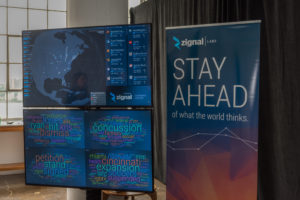
###
